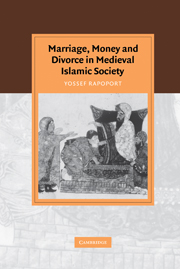Book contents
- Frontmatter
- Contents
- Acknowledgments
- Glossary
- List of abbreviations
- Introduction
- Chapter 1 Marriage, divorce and the gender division of property
- Chapter 2 Working women, single women and the rise of the female ribāṭ
- Chapter 3 The monetization of marriage
- Chapter 4 Divorce, repudiation and settlement
- Chapter 5 Repudiation and public power
- Conclusion
- Bibliography
- Index
- Cambridge Studies in Islamic Civilization
Chapter 3 - The monetization of marriage
Published online by Cambridge University Press: 15 June 2009
- Frontmatter
- Contents
- Acknowledgments
- Glossary
- List of abbreviations
- Introduction
- Chapter 1 Marriage, divorce and the gender division of property
- Chapter 2 Working women, single women and the rise of the female ribāṭ
- Chapter 3 The monetization of marriage
- Chapter 4 Divorce, repudiation and settlement
- Chapter 5 Repudiation and public power
- Conclusion
- Bibliography
- Index
- Cambridge Studies in Islamic Civilization
Summary
Meshullam of Volterra, a perceptive Italian Jewish merchant who visited the Mamluk domains in 1481, thought that Near Eastern marriages brought women none of the security found in the marriages of Europeans. He also thought this was the reason for the high rates of divorce in Mamluk society. During his stay in Jerusalem Meshullam wrote the following:
The customs of the Muslims are diverse from all people … The men give marriage gifts to the women. From the day of marriage the man is only bound to give his wife food, but her clothes and all other things she requires she has to make herself … The wife is bound to pay for the food and clothes of all her sons and daughters. Therefore, the women are all harlots. When they do not wish to stay with their husbands they go to the Niepo [i.e., nā᾿ib or governor] of the city, and say that their husband does not give them food. They are believed, and the husband must divorce his wife. For the Muslims give divorce like the Jews. All men and women and children, Jews as well as Muslims, have these customs … And these customs are usual in the whole kingdom of the Sultan, and not in Jerusalem only … They are all alike.
According to Meshullam, husbands were absolved from giving support in any way other than food.
- Type
- Chapter
- Information
- Marriage, Money and Divorce in Medieval Islamic Society , pp. 51 - 68Publisher: Cambridge University PressPrint publication year: 2005

